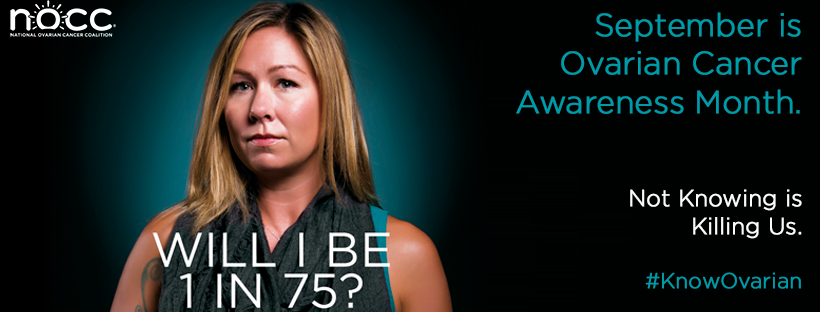September is Ovarian Cancer Awareness Month
With 70% of women diagnosed in advanced stages of ovarian cancer, when prognosis is poor, we know that more needs to be done to spread awareness earlier of this disease that will take the lives of 14,000 women this year. Ovarian cancer is not that common, but because ovarian cancer often goes undetected until it is in an advanced stage, it is the number one cause of deaths from gynecologic cancer in the United States.
Ovarian cancer can develop on the surface of the ovary or from tissues inside the ovary. There are three main types. The type that develops on the surface of the ovary, epithelial ovarian cancer, is the most common type. About 90% of cases of ovarian cancer involve epithelial tumors. Certain risk factors are associated with epithelial ovarian cancer.
The following factors have been shown to increase a woman’s risk of getting this type of cancer:
– Age older than 55 years
– Family history of breast cancer, ovarian cancer, colon cancer, or endometrial cancer (cancer of the lining of the uterus)
– Personal history of breast cancer
– Mutations in BRCA1 and BRCA2 genes
– Never having had children
– Infertility
– Endometriosis
– Lynch Syndrome
Currently, there is no screening test for ovarian cancer. You should be alert to any changes in your body and discuss them with your ob-gyn or health care professional. The earlier that ovarian cancer is diagnosed, the more likely that treatment will be successful.
If you have any of the following symptoms, especially if you have them for more than 12 days per month, contact your doctor:
– Bloating or an increase in abdominal size
– Pelvic or abdominal pain
– Difficulty eating or feeling full quickly
– Urinary symptoms (frequency and urgency)
– Others symptoms can include vaginal bleeding, especially after menopause, and a change in bowel habits
Having these symptoms does not mean that you have ovarian cancer, but it is a good idea to find out what is causing them.
If you have frequent or persistent symptoms of ovarian cancer, you may have a physical exam, including a pelvic exam. An imaging test of the ovaries, such as a transvaginal ultrasound exam, may be done. If a growth is found on an ovary, your ob-gyn may order a blood test to measure your CA 125 level. CA 125 sometimes is increased in women with ovarian cancer. Results of these tests are used to assess the likelihood that the growth is cancer. Test results also will guide the next steps in evaluation.
Women treated for ovarian cancer need to have regular checkups to make certain that the cancer has not come back. A checkup after cancer treatment usually includes a review of symptoms and a physical exam.
Find our more about ovarian cancer at: https://www.acog.org/Patients/FAQs/Ovarian-Cancer
If you have any questions, always consult your doctor at The Woman’s Group.

